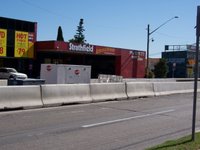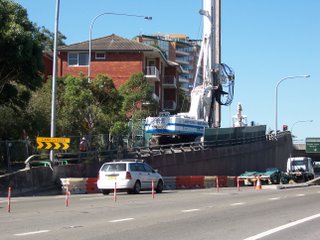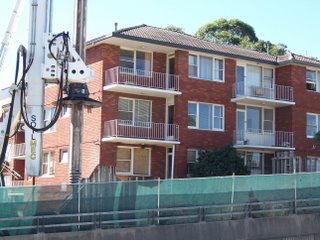The Lane Cove Tunnel included in inquiry
It has been announced that the Upper House inquiry into Sydney's Cross City Tunnel will be widened to include the Lane Cove Tunnel.
The move comes amid increasing concern about future traffic and health impacts of the Lane Cove Tunnel.
NSW Liberal Leader in the Legislative Council Mike Gallacher successfully put forward a motion for the Cross City Tunnel inquiry to investigate issues surrounding the Lane Cove Tunnel, which is due to open in 2007.
There have been several issues of concern regarding the Lane Cove Tunnel. The Opposition claimed that the Government asked for the opening of the tunnel to be delayed until after the next State election due to feared voter backlash. It has also been claimed that the government "traded-off" an extra lane in the tunnel in return for an upfront payment.
Other issues include the tunnel collapsing during construction and surrounding road changes designed to ‘funnel’ traffic into the tunnel, especially the narrowing of Epping Road to one lane each direction.
Also disputed were traffic projections for the tunnel and compensation payments for a delayed opening.
There has been concern amongst residents that motorists may avoid the tunnel once it has opened and extend the current traffic congestion problems to other roads around Lane Cove.
Glenda McSorley from the Lane Cove Tunnel Action Group (LCTAG) Community Liaison Group says that by the time the tunnel is opened it will be an incapacity as it will be too small to cater for the volume of traffic. She says the numbers the Roads and Traffic Authority (RTA) used in relation to traffic use on Epping Road are "soft" and greatly underestimated.
Mrs McSorley says the RTA are narrow-minded concerning the project.
"There’s a mindset in the RTA… that they only build what they need to build now" she said.
"There’s a mindset in the RTA… that they only build what they need to build now" she said.
Mrs McSorley says that another concern is public-private partnerships in general, which "are a sign of poor governmental management".
She believes that unless it’s a matter of expertise, infrastructure should be paid for and maintained by the government.
"It's all got to be very clear and transparent. It’s something the community’s paying for. It’s not right that private companies should get an advantage over the community." Mrs McSorely said. "The Devil’s in the detail."
A spokesperson from the tunnels’ construction company, Theiss John Holland, says the issue of public-private partnerships is beneficial for the government.
"This arrangement (public-private partnerships) is great for the government as they have all the say without paying for it. They have no risk or responsibilities except in local government" the spokesperson said.
In relation to issues about the tunnel Theiss John Holland's spokesperson said "the project was wanted for years. The question is, is it a good or bad thing... You will never have a project of this size not shouted at."
With regard to the report, Mike Gallacher moved that the terms of reference for the Joint Select Committee on the Cross City Tunnel be amended by investigating the role of Government agencies in relation to the negotiation of the contract with the Lane Cove Tunnel Consortium.
It will also explore the extent to which the Lane Cove Tunnel contract was determined through community consultation processes and the RTA’s methodology for tendering and contract negotiation in connection with the Lane Cove Tunnel.
The Cross City Tunnel inquiry, headed by Christian Democrat Fred Nile, was established in November.
This is the building that collapsed as a result of the construction of Lane Cove Tunnel.
By Kate Schneider
11-04-2006
11-04-2006
This is the building that collapsed as a result of the construction of Lane Cove Tunnel.





0 Comments:
Post a Comment
<< Home